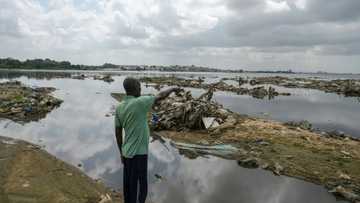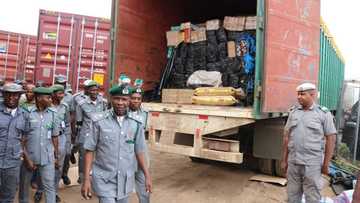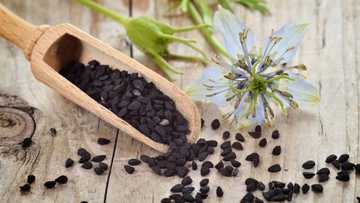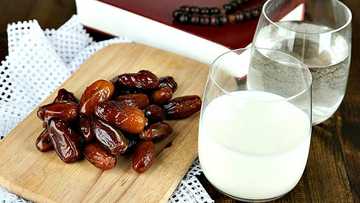Full List of Goods Banned from Being Imported into Nigeria Released by Customs
The Nigeria Customs Service has provided a long list of items/goods that are prohibited from being imported to the country.
PAY ATTENTION: Click “See First” under the “Following” tab to see Legit.ng News on your Facebook News Feed!
The ban, amongst other factors, was put in place to control imports and also protect locally produced goods from unhealthy competition with foreign products.

Source: Facebook
It has, however, been criticised by some economic experts who believe the list of banned items is too long.
"Nigeria now is highly protectionist. Its list of prohibited or restricted imports is long, including items such as carpets, shoes, handbags and most types of furniture. The government also makes a large number of imports, such as textiles and clothing, ineligible for foreign exchange at the central bank’s official window, making it harder to import these items," writes Noah Smith, a Bloomberg opinion columnist in a piece titled How Nigeria Can Avert a Looming Tsunami of Poverty.
Nigeria’s list of prohibited or restricted imports is as follows:
PAY ATTENTION: Share your outstanding story with our editors! Please reach us through info@corp.legit.ng!
1. Live or dead birds including frozen poultry.
2. Pork, beef, bird’s eggs, excluding hatching eggs
3. Refined vegetable oils and fats (includes mayonnaise). Crude vegetable oil is NOT banned from importation.
4. Cane or beet sugar and chemically pure sucrose, in solid form in retail packs.
5. Cocoa butter, powder and cakes.
6. Spaghetti/noodles.
7. Fruit Juice in retail packs.
8. Waters, including mineral waters and aerated waters containing added sugar or sweetening matter or flavored, ice snow, other non-alcoholic beverages and beer and stout (bottled, canned or otherwise packed, but excluding energy or health drinks (liquid dietary supplements).
9. Bagged cement.
10. Medicaments as indicated below:
- Paracetamol tablets and syrups;
- Cotrimoxazole tablets and syrups;
- Metronidazole tablets and syrups;
- Chloroquine tablets and syrups;
- Haematinic formulations; ferrous sulphate and ferrous gluconate tablets, folic acid tablets, vitamin B Complex Tablets (except modified released formulations).
- Multivitamin tablets, capsules and syrups (except special formulations);
- Aspirin tablets (except modified released formulation and soluble aspirin);
- Magnesium trisilicate tablets and suspensions.
- Piperazine tablets and syrups;
- Levamisole tablets and syrups;
- Clotrimazole cream;
- Ointments – penicillin/gentamycin;
- Pyrantel pamoate tablets and syrups; and
- Intravenous fluids (dextrose, normal saline, etc.).
- Waste Pharmaceuticals.
11. Soaps and Detergents in retail packs only.
12. Mosquito Repellent Coils.
13. Sanitary Wares of Plastics and Domestic Articles and Wares of Plastics (but excluding Baby Feeding bottles) and flushing cistern and waterless toilets.
14. Rethreaded and used Pneumatic tires but excluding used trucks tires for rethreading of sized 11.00 x 20 and above.
15. Corrugated Paper and Paper Boards, and cartons, boxes and cases made from corrugated paper and paper boards, toilet paper, cleaning or facial tissue, excluding baby diapers and incontinent pads for adult use.
16. Telephone Re-charge cards and vouchers.
17. Carpets and other textile floor coverings.
18. All types of Foot Wears, Bags and Suitcases but excluding Safety Shoes used in oil industries, sports shoes, canvass shoes all Completely Knocked Down (CKD) blanks and parts.
19. Hollow Glass Bottles of a capacity exceeding 150mls (0.15 liters) of all kinds used for packaging of beverages by breweries and other beverage and drink companies.
20. Used compressors and used fridges/freezers.
21. Used Motor Vehicles above fifteen (15) years from the year of manufacture.
22. Furniture, but excluding baby walkers, laboratory cabinets such as microscope table, fume cupboards, laboratory benches, Stadium Chairs, height adjustments device, base sledge, seat frames and control mechanism, arm guide and head guides. Also excluded are; skeletal parts of furniture such as blanks, upholstered or unfinished part of metal, plastics, veneer, chair shell etc. Also excluded are Motor Vehicle seats and Seats other than garden seats or camping equipment, convertible into beds.
23. Ball Point Pens and parts including refills (excluding tip)
24. Tomato paste or concentrate put up for retail sale
In addition, NCS lists items whose importation is “absolutely prohibited:”
- Air Pistols
- Airmail Photographic Printing Paper.
- All counterfeit/pirated materials or articles including Base or Counterfeit Coin of any Country.
- Beads composed of inflammable celluloid or other similar substances.
- Blank invoices.
- Coupons for Foreign Football pools or other betting arrangements.
- Cowries.
- Exhausted tea or tea mixed with other substances.
- Implements appertaining to the reloading of cartridges.
- Indecent or obscene prints, painting, books, cards, engraving or any indecent or obscene articles.
- Manilas.
- Matches made with white phosphorous.
- Materials of any description with a design which, considering the purpose for which any such material is intended to be used, is likely in - the opinion of the president to create a breach of the peace or to offend the religious views of any class of persons in Nigeria.
- Meat, Vegetables or other provisions declared by a health officer to be unfit for human consumption.
- Piece goods and all other textiles including wearing apparel, hardware of all kinds' crockery and china or earthenware goods bearing inscriptions (whether in Roman or Arabic characters) from the Koran or from the traditions and commentaries on the Koran.
- Pistols disguised in any form.
- Second-hand clothing.
- Silver or metal alloy coins not being legal tender in Nigeria.
- Nuclear Industrial waste and other Toxic waste
- Some spirits
Meanwhile, the Central Bank of Nigeria (CBN) has set up a committee for the revival of the country's cotton, textile and garment industry.
The CBN governor, Godwin Emefiele, who set up the committee in Abuja on Thursday, May 16, said the target is to revive and set up at least 50 textile companies by 2023.
According to Emefiele, the committee will have the responsibility of resuscitating the country’s cotton belt, identify textile clusters, improve cotton production nationwide and boost power supply to textile firms across the clusters.
Source: Legit.ng






